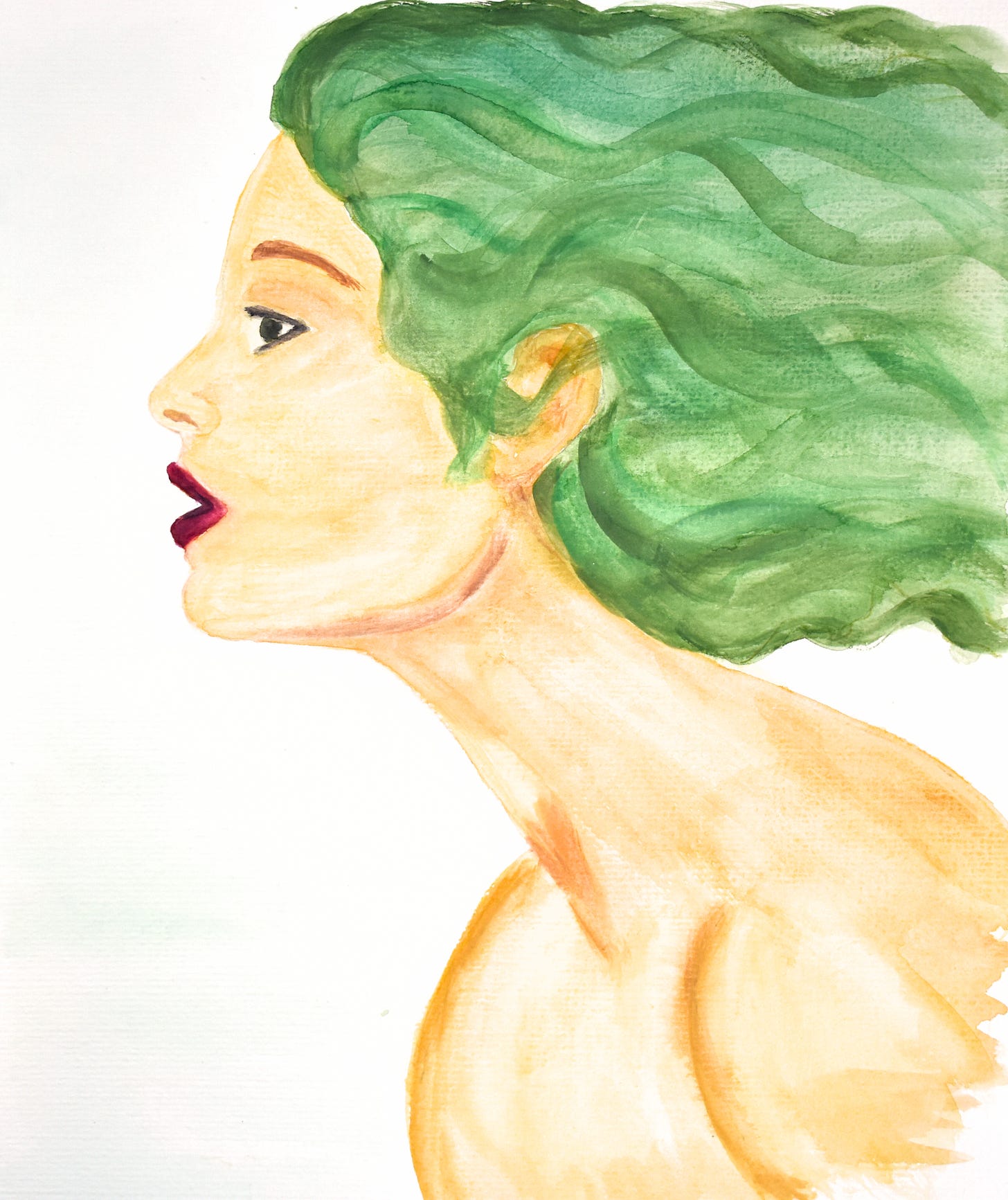Amy Marques is proud to be a recurring contributor to Soft Star Magazine! She penned children’s books, barely read medical papers, and numerous letters before turning to fiction, poetry, and visual art. She is a Pushcart Prize, Best Small Fictions, and Best of the Net nominee and has work published in journals and anthologies including Streetcake Magazine, MoonPark Review, Bending Genres, Gone Lawn, Jellyfish Review, Chicago Quarterly Review, and Reservoir Road Literary Review. You can read more at amybookwhisperer.wordpress.com.
This story was originally published in Corvid Queen in May 2023.
Once there was a motherless girl loved as only those with doting fathers are loved. Servants catered to her every wish, but she was a sweet girl and unspoiled by their care. She learned from the cook that food is best when choice ingredients are prepared simply. She learned from the gardener that a garden is grown by listening to the earth, watching the sun, and placing plants where they are sure to flourish. She learned from the horse master to approach all creatures slowly and that pauses are as important as steps. She learned from her father that learning is better than knowing and questions are a gateway to insight.
One day, her father brought home a new mother and two sisters. The girl was eager to love them, but they turned her away. Soon, the cook was replaced by a sauce master who turned his nose up at the garden and prepared every dish with dry, flavorless herbs purchased in the village. The gardener was deemed incompetent because he wouldn’t make flowers grow in precise rows of coordinated color. The horse master left with the horses, and the girl cried when he paused at the gate, quiet sorrow in his eyes. Her father stopped asking questions because he was too busy answering demands until one day his heart gave out and he was gone, never having explained to the girl why things had to change.
When the new mother realized the father’s riches had been those of earth and not of gold, she was angry. She was an empty woman, hollowed out by greed, so she blamed the girl for her misfortune and ordered her to make amends.
The girl learned that a household has never-ending work, but there can be pleasure in a job well done. She learned the ways of the house and the secrets of the land, but found that though her new mother’s heart was easy to predict, it was impossible to reach.
One day, the new mother heard of a celebration in the village for a guest from the neighboring land who might be in search of a wife. The woman and her daughters ransacked the house for silks, even entering the girl’s room where they found a trunk that had once belonged to her mother.
The woman commanded her daughters to live on crumbs and tea in hopes that they would become willowy and graceful. She wove ribbons into her hair to disguise the gray and painted away the lines on her face. On the day of the celebration, they set off, leaving the girl to find her own way.
The girl picked up her mother’s gown — the one deemed too simple — and watched it float around her, covering her in the green of the hills and the scent of a mother she had barely met. She brushed out her hair and braided it with flowers from the corner garden. The slippers she had found were too tight to bear and too beautiful to mar. So she walked in her bare feet and held the slippers in her hands.
At the village’s edge, she found a well and washed the dust off her feet, then lay in the sunny grass waiting for them to dry. Sounds of merriment reached the girl. She heard her step-sisters’ voices and her new mother’s laugh. She realized that she preferred the company of birds to that of those who, for all her effort, had remained strangers.
So she left the village, never learning that the bard from the neighboring land had noticed her sitting in the grass, dressed in the green of the woods he loved. His riches were those of story and song and he had found little to love among those ambitious only for coin. So he left the festivities to seek her out, but found only the smell of crushed flowers and slippers made of silk.
The girl had returned to a house emptied of books, its walls covered in tapestries that told no stories. No braided garlic hung from rafters; no sage bundles rested on ledges, even the silence sounded different. Wrong somehow.
She no longer belonged here. She wondered why she had never before thought to leave.
She packed her few things: her father’s portrait, seeds she had saved to plant next spring, her mother’s hairbrush, the book of stories her father once read to her, and the small seashell the old horse master had given her when he had told her tales of faraway places. Of the cabin near the woods.
The little cabin was as the horse master had described, its overgrown garden creeping past the walls into the woods beyond. The girl sat at the threshold and inhaled rosemary and lavender. She plucked a leaf from the mint near the door and chewed on it as the moon rose in the night sky. She understood then that solitude was less lonely than being only needed and never wanted. She began to unlearn her pain.
For years, the bard sought the owner of slippers he had kept. He slowly learned to hear the whispering trees that led him to her. Because he had become wise enough to know that pauses were as important as steps, he took the time to ask all the questions and listen to the secrets of her heart.
Thus, the world learned the tale of a fairy who lived on the edge of a wood in a cabin of vines and moss. She wore the green of the treetops and danced, barefoot, in the moonlight. Woodland creatures were her friends and she spoke the language of birds. Wanderers came to her with broken bones and bruised pride, and she set their limbs and sang away their fear. She cared for dragon slayers and huntsmen alike; and her kindness was a balm for the sorrows and guilt that calloused their souls.
And the girl became a woman loved as only those loved by storytellers are loved.







What a lovely retelling of an old story. Beautifully done.
Amei!